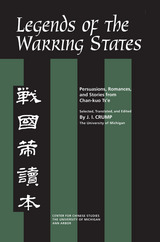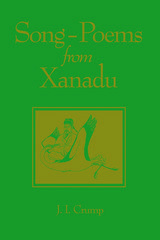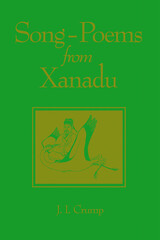3 books about Crump, J.

Legends of the Warring States
Persuasions, Romances, and Stories from Chan-kuo Ts'e
J. I. Crump
University of Michigan Press, 1998
The origins of the Chan-kuo Ts’e (Intrigues of the warring states) as an entity can be traced to a palace librarian at the Han Court, Liu Hsiang (76–6 BCE), who compiled and edited the pre-Han texts (c. 300–221 BCE) into a single volume and gave the collection a name. Thereafter, surviving manuscripts show the Chan-kuo Ts’e circulated during the Later Han Dynasty. Sometime during the years of decline and following the fall of the Han Dynasty, the Chan-kuo Ts’e began to acquire the aura of a wicked book, somewhat analogous to Niccolo Machiavelli’s The Prince. From time to time it was seen as one of a number of books that could unlock immense power in an era characterized both by widespread illiteracy and common belief in literacy and scholarship as the best if not the only vehicle to any goal. After 400 CE, there is no record of the text until it was reconstructed by an 11th-century scholar, Tseng Kung, who formed a model for critical circulation for the next nine centuries.
This volume presents selections and commentary by the premier Western translator and interpreter of the Chan-kuo Ts'e—ninety pieces singled out for their literary sophistication and sprightliness of conception. It also features more complete warring states narratives, the “romances”—persuasions of four of the best-known figures, Fan Chü, Chang Yi, Su Ch'in, and Ch'un-shen Chün, augmented by biographical material from the Shi-chi. This reader highlights both the nature of Chan-kuo Ts'e, an important pre-Han collection, and its considerable pleasures.
[more]

Song-Poems from Xanadu
J. I. Crump
University of Michigan Press, 1993
If the title Song-Poems from Xanadu seems hauntingly familiar to the reader, it is because there is another book called Songs from Xanadu, written by the same author between 1979 and 1983, primarily as a rigorous attempt to make some sense out of the technical and prosodic questions which these songs raise about themselves. The editor at the Center for Chinese Studies noted somewhat wistfully that Songs from Xanadu would have been a perfect title for the present book. Since the author already used that title up on a somewhat stuffier work, he tried to mollify the editor by choosing a title that sounded as much like the one he preferred as possible. Being largely directed at specialists in Chinese literature, the first book differs greatly from this, its sequel, which is written for those who know next to nothing about its subject. [ix-x]
[more]

Song-Poems from Xanadu
J. I. Crump
University of Michigan Press, 1993
If the title Song-Poems from Xanadu seems hauntingly familiar to the reader, it is because there is another book called Songs from Xanadu, written by the same author between 1979 and 1983, primarily as a rigorous attempt to make some sense out of the technical and prosodic questions which these songs raise about themselves. The editor at the Center for Chinese Studies noted somewhat wistfully that Songs from Xanadu would have been a perfect title for the present book. Since the author already used that title up on a somewhat stuffier work, he tried to mollify the editor by choosing a title that sounded as much like the one he preferred as possible. Being largely directed at specialists in Chinese literature, the first book differs greatly from this, its sequel, which is written for those who know next to nothing about its subject. [ix-x]
[more]
READERS
Browse our collection.
PUBLISHERS
See BiblioVault's publisher services.
STUDENT SERVICES
Files for college accessibility offices.
UChicago Accessibility Resources
home | accessibility | search | about | contact us
BiblioVault ® 2001 - 2024
The University of Chicago Press









